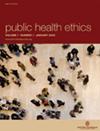儒家福利主义:健康和福利制度团结的思想起源
IF 2
3区 哲学
Q2 ETHICS
引用次数: 0
摘要
团结被认为是现代民主国家再分配健康和福利制度的基础;然而,它通常被认为是西方的概念,或者更具体地说,是欧洲的概念。虽然保健和福利制度已成功地移植到许多非西方发达国家,但这种制度所必需的团结是否存在或是否在智力上可用仍在辩论中。以一个具有儒家传统的东亚国家为例,我首先论证了儒家传统对健康和福利团结具有特殊的理论和社会学意义。然后,通过对经典儒家著作的考察,我对儒家思想的基本概念,即孝道、仁政和天命,提出了转变的解释。在此基础上,儒家思想中以家庭为基础的差异化团结和以人为本的思想可以被重新构想,以适应现代自由民主的政治制度和福利安排。我把这种模式称为儒家福利主义,我认为它可以为那些相信或认同儒家精神的人形成团结的思想根源。本文章由计算机程序翻译,如有差异,请以英文原文为准。
Confucian Welfarism: Intellectual Origins of Solidarity for Health and Welfare Systems
Abstract Solidarity is presumed to underpin the redistributive health and welfare systems in modern democracies; however, it is often considered a Western—or more specifically, European—concept. While health and welfare systems have been transplanted successfully to many non-Western developed countries, whether the solidarity necessary for such systems exists or is intellectually available remains under debate. Using an East Asian country with the Confucian tradition as an illustrative case, I first argue that the Confucian tradition has special theoretical and sociological importance for health and welfare solidarity. Then, through investigating the classic Confucian writings, I propose transformed interpretations of the essential concepts of Confucian thought, namely filial piety, benevolent governance and the mandate of heaven. With these interpretations, the differentiated family-based solidarity and the people-rooted thought in Confucianism could be reimagined to fit with the modern liberal-democratic political regime and welfare arrangements. I call this model Confucian welfarism, which I argue could form the intellectual origins of solidarity for people who believe in or have an affinity to Confucian ethos.
求助全文
通过发布文献求助,成功后即可免费获取论文全文。
去求助
来源期刊

Public Health Ethics
PUBLIC, ENVIRONMENTAL & OCCUPATIONAL HEALTH-MEDICAL ETHICS
CiteScore
3.10
自引率
9.50%
发文量
28
审稿时长
>12 weeks
期刊介绍:
Public Health Ethics invites submission of papers on any topic that is relevant for ethical reflection about public health practice and theory. Our aim is to publish readable papers of high scientific quality which will stimulate debate and discussion about ethical issues relating to all aspects of public health. Our main criteria for grading manuscripts include originality and potential impact, quality of philosophical analysis, and relevance to debates in public health ethics and practice. Manuscripts are accepted for publication on the understanding that they have been submitted solely to Public Health Ethics and that they have not been previously published either in whole or in part. Authors may not submit papers that are under consideration for publication elsewhere, and, if an author decides to offer a submitted paper to another journal, the paper must be withdrawn from Public Health Ethics before the new submission is made.
The editorial office will make every effort to deal with submissions to the journal as quickly as possible. All papers will be acknowledged on receipt by email and will receive preliminary editorial review within 2 weeks. Papers of high interest will be sent out for external review. Authors will normally be notified of acceptance, rejection, or need for revision within 8 weeks of submission. Contributors will be provided with electronic access to their proof via email; corrections should be returned within 48 hours.
 求助内容:
求助内容: 应助结果提醒方式:
应助结果提醒方式:


